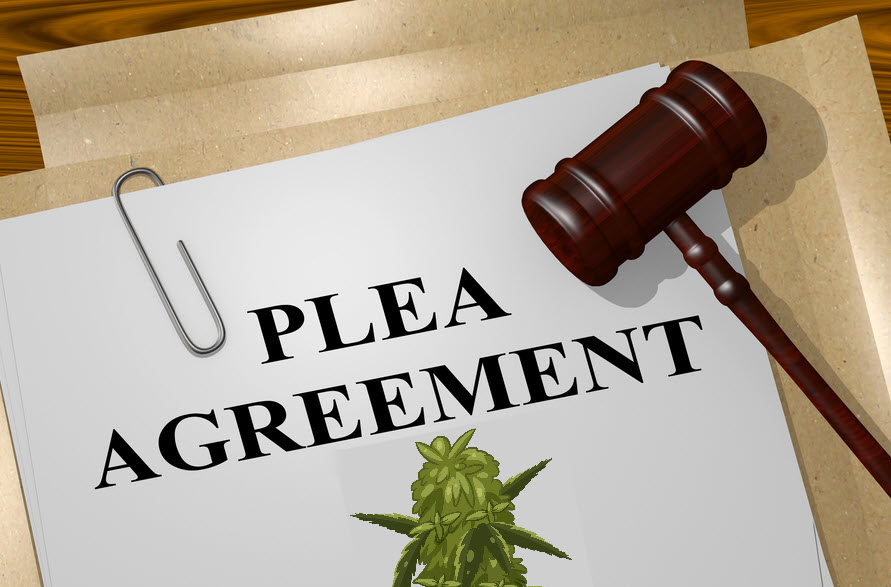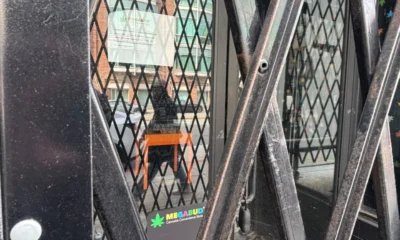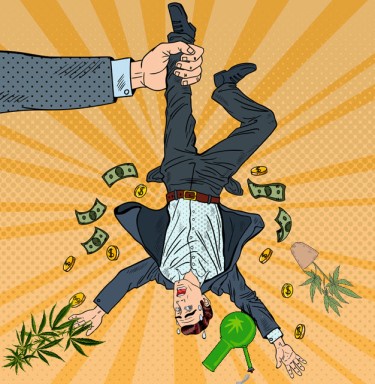Cannabis News
Chairman of High Times Pleads Guilty to $20 Million in Securities Fraud, Then Decides to Change His Guilty Plea?
Published
6 days agoon
By
admin

In a significant development within the cannabis industry, Adam Levin, the chairman of Hightimes Holding Corp., has agreed to plead guilty to conspiracy charges related to a scheme involving undisclosed payments made to an investment analyst. Or is he? Adam plans to change his guilty plea in a new court proceeding that is coming up. So what gives?
Th original scheme aimed to promote Hightimes’ securities offering, raising serious questions about transparency and ethical practices in the burgeoning cannabis market. As the industry continues to navigate regulatory challenges and public scrutiny, this case highlights the complexities and potential pitfalls that companies face as they seek to capitalize on the growing acceptance of cannabis.
Background on Hightimes Holding Corp.
Hightimes Holding Corp., the parent company of the iconic cannabis culture brand High Times, has been a prominent player in the cannabis industry since its inception. Founded in 1974, High Times has long been associated with cannabis advocacy, culture, and education. Over the years, it has evolved into a multimedia company encompassing print publications, events, and digital platforms focused on cannabis.
In recent years, as legalization efforts gained momentum across various states in the U.S., Hightimes sought to capitalize on this trend by transitioning into a publicly traded entity. In 2020, the company announced its intention to go public through a reverse merger with a publicly traded shell company. This move was seen as a way for Hightimes to access capital markets and fund its expansion initiatives.
However, the journey has not been without its challenges. The company has faced various legal and financial hurdles, including allegations of fraud and operational mismanagement that ultimately led to its receivership in 2024. These issues have raised concerns among investors regarding the company’s governance and financial practices.
The Scheme Uncovered
The recent developments surrounding Adam Levin center on allegations that he participated in a scheme to make undisclosed payments to an investment analyst who promoted Hightimes’ securities offering. According to court documents filed on December 20, 2024, Levin agreed to plead guilty to conspiracy charges related to this arrangement.
The scheme reportedly involved over $150,000 in payments made to the analyst as part of an effort to artificially inflate investor interest in Hightimes’ stock. By compensating the analyst for favorable coverage without disclosing these payments, Levin and others involved sought to create a misleading impression of demand for the company’s securities. This lack of transparency is particularly concerning given the regulatory environment surrounding securities offerings, which mandates full disclosure of any compensation arrangements that could influence an analyst’s recommendations.
The Investigation into this scheme was initiated by both the U.S. Department of Justice (DOJ) and the Securities and Exchange Commission (SEC), highlighting a broader scrutiny of practices within the cannabis industry. As more companies enter this rapidly evolving market, regulators are increasingly vigilant about ensuring compliance with securities laws and protecting investors from potential fraud.
## Legal Consequences
As part of his plea agreement, Adam Levin is set to appear in court on January 17, 2025. He faces a potential maximum sentence of five years in federal prison for his role in the conspiracy. The plea agreement indicates that Levin is cooperating with authorities as they continue their investigation into Hightimes and its business practices.
The legal ramifications extend beyond Levin himself; they also raise questions about corporate governance within Hightimes Holding Corp. The company’s board of directors will likely face increased scrutiny regarding their oversight responsibilities and whether they adequately monitored Levin’s actions.
In addition to potential criminal charges for individuals involved in such schemes, companies can also face civil penalties from regulatory agencies like the SEC. These penalties can include fines, disgorgement of profits obtained through fraudulent activities, and restrictions on future business operations.
Implications for Hightimes Holding Corp.
The fallout from Levin’s plea agreement is likely to have significant implications for Hightimes Holding Corp. The company has already been grappling with various challenges related to its financial stability and reputation within the industry. The revelation of this scheme adds another layer of complexity to an already precarious situation.
1. Investor Confidence
One immediate concern is how this development will affect investor confidence in Hightimes Holding Corp. Investors are increasingly cautious about putting their money into companies embroiled in legal controversies or allegations of fraud. Given that Hightimes has already faced scrutiny over its business practices, this latest revelation could deter potential investors from participating in future funding rounds or purchasing shares.
2. Regulatory Scrutiny
The ongoing investigation by federal authorities is likely to result in heightened regulatory scrutiny for Hightimes Holding Corp. Companies operating within the cannabis space must navigate a complex web of federal and state regulations; any indication of wrongdoing can lead regulators to take a closer look at a company’s operations. This increased scrutiny may result in further investigations or audits that could disrupt business operations and hinder growth prospects.
3. Reputation Damage
Hightimes has built its brand around cannabis culture and advocacy; however, allegations of unethical practices can tarnish its reputation among consumers and advocates alike. As public perception plays a crucial role in the success of cannabis companies, any damage done to Hightimes’ reputation could have long-lasting effects on its market position and ability to attract customers.
4. Operational Challenges
With Levin’s impending court appearance and potential sentencing looming over the company, operational challenges may arise as key leadership figures are embroiled in legal battles. Uncertainty regarding leadership stability can create internal disruptions that hinder decision-making processes essential for navigating an evolving market landscape.
Cannabis Industry Challenges
Levin’s case is not an isolated incident but rather part of broader challenges facing the cannabis industry as it matures. As more states legalize cannabis for medical or recreational use—leading some companies toward lucrative opportunities—regulatory compliance becomes increasingly critical.
1. Regulatory Landscape
The regulatory landscape surrounding cannabis remains complex due largely to its classification as a Schedule I substance under federal law despite legalization efforts at state levels. Companies must navigate differing regulations across jurisdictions while ensuring compliance with federal securities laws when seeking investments or going public.
2. Market Competition
As competition intensifies within the cannabis sector—both from established players like Hightimes and new entrants—companies face pressure not only regarding compliance but also profitability metrics that appeal directly toward investors seeking returns on their investments.
3. Public Perception
Public perception plays an essential role in shaping consumer behavior within emerging markets like cannabis; negative headlines can quickly sway opinions against brands perceived as engaging in unethical practices or lacking transparency—further complicating efforts toward building trust among consumers who prioritize ethical sourcing methods when choosing products they consume.
Conclusion
The case involving Adam Levin, chairman of Hightimes Holding Corp., underscores critical issues of transparency and ethical conduct within the cannabis industry, highlighting the potential legal and reputational repercussions that can arise from undisclosed financial arrangements. As Levin prepares to plead guilty to conspiracy charges related to undisclosed payments aimed at promoting the company’s securities offering, this incident serves as a cautionary tale for cannabis companies navigating the complexities of regulatory compliance and investor relations. The fallout from this case not only threatens Hightimes’ financial stability and investor confidence but also reflects broader challenges facing the industry as it matures, emphasizing the need for robust corporate governance and ethical practices to foster trust among consumers and investors alike. Ultimately, the developments surrounding Hightimes and Levin illustrate the delicate balance that cannabis companies must maintain between pursuing growth opportunities and adhering to legal and ethical standards in an increasingly scrutinized market.
HIGH TIMES DRAMA GALORE, READ ON…
You may like
-


What Trump’s Cannabis Policy Means for America and the International Markets
-


Texas Hates Weed…Not! – 62% of Registered Voters Support Cannabis Legalization in the Lone Star State
-


Linked In Post – Jon Dennis, Psychedelic Lawyer: Washington SB 5201, the regulated psilocybin access bill, was considered today by the Senate Committee on Labor & Commerce ( 18 Feb 2025)
-


The rapid collapse of MedMen co-founders’ latest marijuana venture
-


David Downs’ sickest weed genetics picks of 2025
-


The Future King of Cannabis will be THC-Infused Beverages
Cannabis News
What Trump’s Cannabis Policy Means for America and the International Markets
Published
7 hours agoon
February 20, 2025By
admin

The Current Climate of Cannabis and international implications of Trump policies
Just when you thought the world of cannabis policy couldn’t get any stranger, we find ourselves in what feels like a political acid trip gone sideways. It’s been over a month since Trump reclaimed his seat in the spotlight, and while the apocalypse hasn’t arrived (yet), we’re witnessing some seriously mind-bending policy proposals that would make even Salvador Dalí question reality.
Picture this: Trump wants to rename the Gulf of Mexico (because apparently, geography needs a MAGA makeover), slap massive tariffs on our neighbors like he’s dealing cards at a high-stakes poker game, and has his sights set on everything from Greenland to the Panama Canal. It’s like watching a real-estate mogul play Risk with actual countries.
But here’s where things get particularly interesting for us cannabis enthusiasts: Trump’s declaration of drug cartels as terrorist organizations and his war cry to ramp up the War on Drugs in response to the fentanyl crisis. Now, I’ve been analyzing drug policy long enough to know that when politicians start throwing around terms like “terrorist” and “war on drugs” in the same sentence, we’re in for some interesting times.
As someone who’s watched the cannabis industry evolve from back-alley dealings to billion-dollar legitimate businesses, I can’t help but feel a sense of déjà vu mixed with genuine concern. Are we about to witness a dramatic shift in the progress we’ve made toward legalization? Will international cannabis trade become another casualty in this new era of aggressive foreign policy?
Today, I’m going to break down what Trump’s presidency might mean for cannabis policy, both domestically and internationally. Buckle up, folks – we’re in for a wild ride through the next four years, and if there’s one thing I’ve learned about cannabis policy, it’s that reality often proves stranger than fiction.
Let me tell you something about the War on Drugs that you won’t find in textbooks or policy papers. I lived in Mexico during the bloodiest period of its drug war, 2006-2012, and what I witnessed was far from the sanitized version most Americans hear about on their evening news.
While today’s headlines about shootouts in Culiacán might shock you, they pale in comparison to what happened during Calderón’s presidency. Imagine driving to work and seeing bodies hanging from highway overpasses, their lifeless forms swaying in the morning breeze – a grotesque warning to anyone who dared oppose the cartels. Decapitations weren’t just plot devices in cartel documentaries; they were a weekly occurrence in many cities.
The psychological terrorism was perhaps even worse than the physical violence. Picture this: you’re having dinner with your family at a nice restaurant, trying to maintain some semblance of normalcy, but there’s always that nagging fear in the back of your mind. At any moment, a drug lord and his heavily armed crew might walk in, confiscate everyone’s phones, and essentially hold you hostage while they enjoy their meal. Sure, they’d usually pay for everyone’s drinks – a twisted form of narco-courtesy – but the message was clear: they owned the streets, and by extension, they owned you.
For my American readers, I know the War on Drugs conjures images of militarized police raids and overcrowded prisons – and trust me, that’s bad enough. The U.S. version of this “war” was about turning citizens into state-owned slaves, filling private prisons with nonviolent offenders, and destroying communities, particularly communities of color. But the level of violence never reached the near-apocalyptic scenes I witnessed in Mexico and Colombia.
Now here’s where things get really concerning. Cannabis might be legal in many states today, with dispensaries replacing dealer’s numbers in our phones, but Trump’s recent move to label drug cartels as “terrorist organizations” is like throwing gasoline on a smoldering fire. This isn’t just semantic gymnastics – it’s a fundamental shift from a police action to a military operation.
Some of you might be thinking, “Good! Send in the military! That’ll show them!” Trust me, as someone who’s seen what happens when you militarize this conflict, that’s about as smart as using a flamethrower to kill a mosquito. It doesn’t just escalate the violence; it transforms entire regions into war zones where civilian casualties become “collateral damage” in an unwinnable war.
A few weeks ago, I was practically dancing in my home office when I heard RFK Jr. might be heading up Health and Human Services. Finally, I thought, someone who might bring a fresh perspective to national cannabis policy. But my enthusiasm went up in smoke faster than a joint at a Snoop Dogg concert when he announced he’d “defer to the DEA on marijuana rescheduling.” Talk about a buzzkill – we’re right back where we started.
Trump’s new Attorney General isn’t exactly Jeff “Good People Don’t Smoke Marijuana” Sessions 2.0, but let’s just say she won’t be joining your local NORML chapter anytime soon. However, there might be an unexpected opportunity hidden in this chaos. See, Trump seems laser-focused on fentanyl, with cannabis barely registering on his radar. But here’s where things get interesting – and complicated.
The cannabis industry is like a giant spider web, connecting Chinese triads, Mexican cartels, local farmers, legal operators, and everyone in between. We’ve got constitutional legalization in Canada and Mexico, plus more than half of U.S. states with some form of legal cannabis. It’s a complex ecosystem that’s about to get shaken up by Trump’s declaration of war on cartels.
Here’s the problem: as long as cannabis remains Schedule I, law enforcement will keep playing whack-a-mole with both legitimate and illegitimate operations. But while your local grow might have a security guard with a Glock, they’re not exactly rolling with military-grade weapons like the cartels. And let’s not kid ourselves – cartel influence runs deeper than most Americans realize. Hell, major banks have been caught laundering their money, proving that suits can be just as dirty as street dealers.
So how do we prevent Trump’s War on Fentanyl from turning into a bloodbath that engulfs the entire cannabis industry? There’s only one real solution: complete removal of cannabis from the Controlled Substances Act. Not rescheduling, not decriminalization – full federal legalization.
Think about it: Trump could strike a major blow against the cartels by legitimizing one of their biggest cash crops. When cannabis becomes as common as Budweiser, the cartels lose their ability to control the market. No more underground grows, no more smuggling operations, no more violence over territory – just good old-fashioned American capitalism.
But here’s the catch – this can only happen through Congress. The cannabis community needs to mobilize like never before, flooding representatives’ offices with calls, emails, and visits. We need to make it clear that federal legalization isn’t just about getting high; it’s about national security, economic opportunity, and ending a cycle of violence.
Is it a long shot? Sure. About as likely as finding seeds in top-shelf dispensary bud. But stranger things have happened in American politics, and sometimes the most unlikely scenarios create the perfect storm for change. Besides, what’s the alternative? Sitting back and watching as decades of progress potentially go up in smoke?
So dream big, my friends. Sometimes those impossible dreams are the only ones worth fighting for.
Let me be crystal clear about something: anyone thinking Mexico is going to be another Afghanistan clearly hasn’t been paying attention. While the U.S. military had a jolly old time “protecting” Afghan poppy fields (funny how that heroin epidemic exploded, right?), Mexico is an entirely different animal.
For starters, Mexico’s constitution predates the invention of the telegraph. Within this venerable document lies a crystal-clear message: foreign military operations on Mexican soil equal an act of war. Period. No asterisks, no fine print, no “but what if we’re really nice about it?” clause. This isn’t some far-flung territory where you can drum up WMD allegations – this is our next-door neighbor with deep international ties.
Speaking of ties, Mexico isn’t some isolated nation that the international community can conveniently ignore. We’re talking about a country with major investment deals with China, Europe, and pretty much every other significant player on the global stage. Any U.S. military action in Mexico would trigger an international crisis that would make the Cuban Missile Crisis look like a schoolyard spat.
So what can Trump actually do? He’s limited to border theatrics, training Mexican forces (because that worked so well with Los Zetas, right?), and supplying weapons. And here’s where it gets really dark: those same weapons will inevitably end up in cartel arsenals. It’s like trying to put out a fire by throwing gasoline-soaked rags at it – you’re just making the problem exponentially worse.
The result? Another bloodbath. Hundreds of thousands dead. And for what? The drugs won’t stop flowing – they never do. They’ll just get more expensive, forcing addicts into increasingly desperate measures to fund their habits. Theft, assault, kidnapping, murder – the whole ugly spiral of addiction-driven crime will accelerate. Your quiet suburban neighborhood won’t feel so safe anymore.
How can I be so certain? Because I’ve watched this same movie play out for over half a century. The War on Drugs is like a bad horror franchise – it keeps coming back with the same plot, just bloodier each time. There’s no victory scenario here, folks. This path only leads to more state control, less personal freedom, more danger, more addiction, and more death.
At this point, our best hope is that Trump’s tough talk is just another negotiating tactic – his trademark “Art of the Deal” approach to getting what he really wants. But if the man with the golden combover has his heart set on destruction, we might be entering one of the bloodiest chapters in North American history. The only winners will be the usual suspects: the war profiteers, the prison industrial complex, and those who feast on human misery.
Remember, we’ve seen this show before. The only difference is that this time, the stakes are higher and the consequences could be catastrophic. Let’s hope cooler heads prevail, because the alternative isn’t just bad – it’s apocalyptically stupid.
TRUMP ON CANNABIS, NOW WHAT, READ ON…
TRUMP IS A BUSINESS MAN, HE WILL LEGALIZE WEED FOR TAXES AND JOBS?
Cannabis News
Texas Hates Weed…Not! – 62% of Registered Voters Support Cannabis Legalization in the Lone Star State
Published
1 day agoon
February 19, 2025By
admin

In recent years, the conversation surrounding cannabis legalization has evolved significantly across the United States, and Texas is no exception. A recent poll conducted by the University of Houston’s Hobby School of Public Affairs has revealed that 62% of Texans support the legalization of recreational cannabis. This finding not only highlights a shift in public opinion but also raises important questions about the future of cannabis policy in one of the largest and most conservative states in the nation.
Understanding the Numbers
The poll, which surveyed 1,200 adult residents of Texas, provides a comprehensive look at public sentiment regarding cannabis. Here are some key findings:
62% of Texans Favor Legalization. The poll indicates that a clear majority of Texans are in favor of legalizing recreational cannabis. This is a significant increase from previous years when support was much lower.
79% Support Medical Use. The survey found that an overwhelming 79% of respondents support the legalization of medical marijuana, particularly for patients with a doctor’s prescription. This reflects a growing recognition of the therapeutic benefits of cannabis.
69% Favor Decriminalization. The poll also revealed that 69% of Texans support decriminalizing low-level cannabis possession. This suggests a desire to reduce the legal penalties associated with minor cannabis offenses.
Cross-Party Support: Notably, support for legalization transcends party lines. The poll shows that 71% of Democrats and 53% of Republicans are in favor of legalizing recreational cannabis. This bipartisan support is crucial in a state where political polarization is often pronounced.
Concerns About THC Products
55% Support THC Consumables Ban. Interestingly, while there is strong support for legalization, the poll also found that 55% of respondents—61% of Republicans and 48% of Democrats—support banning consumable THC products derived from hemp. This reflects ongoing concerns about product safety and regulation.
Cannabis Legislation in Texas
To understand the current landscape of cannabis legalization in Texas, it is essential to consider the historical context. Cannabis has been illegal in Texas since the early 20th century, with laws becoming increasingly stringent over time.
Early Legislation
Marihuana Tax Act (1937): The federal government’s Marihuana Tax Act effectively criminalized cannabis across the United States, including Texas. This marked the beginning of a long-standing prohibition era.
War on Drugs
The War on Drugs intensified during the 1980s, leading to harsher penalties for drug offenses, including cannabis-related crimes. This era saw a significant increase in arrests and incarceration rates for drug offenses.
Medical Cannabis Legalization
Compassionate Use Act (2015): In 2015, Texas passed the Compassionate Use Act, allowing limited access to medical cannabis for patients with specific medical conditions such as epilepsy and multiple sclerosis. This marked a pivotal moment in Texas’s approach to cannabis but remained restrictive compared to other states.
Legislative Challenges and Opportunities
Despite growing public support for cannabis legalization, legislative efforts have faced significant challenges in Texas.
Conservative Leadership: Texas has historically been governed by conservative leadership that has resisted efforts to liberalize drug laws. Governor Greg Abbott and Lieutenant Governor Dan Patrick have both expressed opposition to full-scale legalization.
2021 Legislative Session: During the 2021 session, several bills aimed at legalizing recreational cannabis were introduced but ultimately failed to gain traction. The political climate remains divided, with many lawmakers hesitant to embrace change.
Grassroots Movements: Advocacy groups such as NORML (National Organization for the Reform of Marijuana Laws) and Texans for Responsible Marijuana Policy have been working tirelessly to educate the public and lawmakers about the benefits of legalization. Their efforts have contributed to shifting public opinion.
Economic Implications of Cannabis Legalization
One compelling argument for cannabis legalization is its potential economic impact.
Legalizing cannabis could create thousands of jobs in various sectors, including agriculture, retail, and manufacturing. States that have legalized cannabis have seen significant job growth in these areas.
Legalizing and regulating cannabis could generate substantial tax revenue for Texas. States like Colorado and California have reported millions in tax revenue from cannabis sales, which can be allocated toward education, healthcare, and infrastructure projects.
Legalization could also attract tourists interested in experiencing legal cannabis markets. This influx could provide a much-needed boost to local economies.
Social Justice Considerations
Another critical aspect of the cannabis legalization debate is its implications for social justice.
Studies have shown that communities of color are disproportionately affected by cannabis-related arrests despite similar usage rates among racial groups. Legalization could help address these disparities by reducing arrests and convictions related to low-level offenses.
Legalization efforts often include provisions for expunging criminal records related to past cannabis offenses. This can provide individuals with a fresh start and improve their employment prospects.
Health Implications and Public Safety
While many advocate for legalization based on economic and social justice arguments, health implications must also be considered.
Health Benefits, as mentioned earlier, many Texans support medical marijuana use due to its potential health benefits. Research has shown that cannabis can help manage chronic pain, anxiety disorders, epilepsy, and other conditions. Delta-8 THC from hemp has massive sales in Texas, but problems remain with testing and safety of these products.
Public Safety Concerns
One argument against legalization is the potential increase in impaired driving incidents. However, proponents argue that regulation can lead to safer consumption practices and education about responsible use.
Future Prospects for Cannabis Legalization in Texas
Given the current polling data indicating strong public support for legalization, what does the future hold for cannabis policy in Texas?
As more states move toward legalization both recreationally and medically, Texas may feel pressure to reconsider its stance on cannabis policy. Lawmakers may find it increasingly challenging to ignore their constituents’ desires as public opinion continues to shift.
With grassroots movements gaining momentum, there is potential for ballot initiatives aimed at legalizing recreational cannabis in future elections. If advocates can mobilize enough support, they may bring this issue directly to voters.
Conclusion
The recent poll indicating that 62% of Texans support cannabis legalization marks a significant turning point in public opinion regarding this contentious issue. As attitudes continue to evolve alongside changing social norms and economic considerations, Texas may soon find itself at a crossroads regarding its approach to cannabis policy. While challenges remain particularly from conservative lawmakers; the growing bipartisan support among Texans suggests that meaningful change could be on the horizon. As advocacy efforts intensify and more residents recognize the potential benefits of legalization from economic growth to social justice the conversation surrounding cannabis in Texas will likely continue to gain momentum.
In summary, as we look toward the future, it is clear that Texans are ready for change when it comes to cannabis legislation. Whether through legislative action or grassroots initiatives, there is an undeniable push toward a more progressive approach that reflects the will of the people—a development that could reshape not only Texas but also set a precedent for other states grappling with similar issues across the nation.
TEXAS MEDICAL MARIJUANA, SAY WHAT? READ ON…
Cannabis News
The Future King of Cannabis will be THC-Infused Beverages
Published
2 days agoon
February 18, 2025By
admin

As someone who’s been dancing with Mary Jane for over two decades, I’ve watched the cannabis industry evolve from simple flower into an endless array of innovative products. I’ve tried just about every form of cannabis imaginable – from traditional joints to high-tech dabs, from basic brownies to sophisticated gummies, and everything in between.
For most old-school stoners like myself, smoking flower still reigns supreme. Sure, concentrates have carved out their niche, and edibles have certainly found their place in the cannabis kingdom. But there’s one product category that remains tantalizingly out of reach, one holy grail that could revolutionize not just cannabis consumption, but potentially reshape the entire recreational substance industry.
I’m talking about cannabis beverages. Now, before you rush to tell me they already exist – trust me, I know. But what’s currently on the market isn’t even close to what it needs to be. The first company to crack this code – to create the perfect cannabis drink that rivals the ease and social experience of cracking open a beer – stands to make billions.
This isn’t just speculation. Recent market research suggests we’re on the cusp of a beverage revolution, and cannabis is perfectly positioned to lead the charge. Let’s explore why the future king of cannabis isn’t a product that you smoke, dab, or eat – it’s one you’ll drink.
The numbers don’t lie, and they’re telling us something extraordinary. According to a recent study published in the British Food Journal, roughly 53-56% of beer drinkers are open to trying cannabis-infused beverages. Let that sink in for a moment. We’re not talking about a small niche market here – we’re talking about potentially converting half of the beer-drinking population into cannabis beverage consumers.
To put this in perspective, the U.S. beer market generates approximately $100 billion annually. If even a quarter of those open to trying cannabis beverages became regular consumers, we’re looking at a potential market worth tens of billions of dollars. This isn’t just a business opportunity; it’s an industry-defining moment waiting to happen.
But here’s the catch – and it’s a big one. When someone cracks open a beer, they generally know what to expect. Whether it’s a light beer at 4% alcohol or a craft brew at 7%, drinkers understand their limits. Through years of social drinking, people have learned their “sweet spot” – maybe it’s two beers for a pleasant buzz, or three for a livelier evening. The standardization of alcohol content has created a predictable, manageable drinking experience.
Cannabis beverages, however, are still stuck in the Wild West phase. Sure, you might see “10mg THC” printed on the can, but that same dose can floor one person while barely affecting another. The inconsistency isn’t just about individual tolerance – it’s about the fundamental challenge of creating a standardized cannabis drinking experience. Absorption rates vary wildly, onset times are unpredictable, and the overall effects can be all over the map.
This inconsistency is the Achilles’ heel of the current cannabis beverage market. Until someone figures out how to create a product that delivers a consistent, predictable experience – something as reliable as cracking open a Bud Light or a Corona – cannabis beverages will remain a novelty rather than the industry titan they could become.
Major players have already dipped their toes into the cannabis beverage pool. Companies like Pabst Blue Ribbon have launched cannabis-infused seltzers, while Lagunitas offers their Hi-Fi Hops drinks. Even beverage giant Constellation Brands (the folks behind Corona) invested billions in Canopy Growth, signaling big alcohol’s serious interest in the space. Yet, despite these heavy hitters throwing their hats in the ring, we still haven’t seen the breakthrough product that could truly revolutionize the market.
The fundamental challenge lies in creating a standardized drinking experience. Currently, most cannabis beverages rely on traditional THC infusion methods, which leads to unpredictable absorption rates and that dreaded “wait and see” game that’s familiar to anyone who’s eaten an edible. Some companies are experimenting with nano-emulsification technology to make THC molecules more water-soluble, potentially leading to faster onset times and more consistent effects. But we’re not quite there yet.
Here’s where things get really tricky: when cannabis is processed through the liver (as it is with traditional edibles and current beverages), it gets converted into 11-Hydroxy-THC, which packs roughly four times the punch of regular THC. This is why you might feel fine after one cannabis beverage, then suddenly find yourself on Mars after the second one kicks in. Unlike alcohol, where you can generally gauge your level of intoxication as you drink, cannabis beverages can stack up in unexpected ways, leading to the dreaded “green out.”
What the industry needs is some sort of revolutionary chemistry – perhaps a form of THC that bypasses liver processing, or a formulation that caps the conversion to 11-Hydroxy-THC. Maybe it’s about developing a cannabis beverage that provides a short-lived buzz, similar to alcohol’s relatively predictable duration. Or perhaps it’s about creating a self-limiting effect that prevents overconsumption.
The solutions might seem elusive, but the potential reward is staggering. The first company to crack this code – to create a cannabis beverage that allows people to drink socially without fear of unexpected intensity or duration – will essentially be sitting on a gold mine. We’re talking about potentially billions in revenue, not to mention the distinction of creating an entirely new category of social consumption.
The challenge is complex, but the market is ready. With over half of beer drinkers expressing interest in cannabis beverages, the demand is clearly there. Now it’s just a matter of who will solve the chemistry puzzle first. As someone who’s watched this industry evolve for decades, I can tell you – that breakthrough is coming. And when it does, it will fundamentally change not just how we consume cannabis, but potentially how we socialize altogether.
THC-INFUSED BEVERAGES ARE HERE, READ ON…
SORRY, NO BOOZE SERVED – MIAMI FESTIVAL ONLY SERVES THC DRINKS!

What Trump’s Cannabis Policy Means for America and the International Markets

Texas Hates Weed…Not! – 62% of Registered Voters Support Cannabis Legalization in the Lone Star State

Linked In Post – Jon Dennis, Psychedelic Lawyer: Washington SB 5201, the regulated psilocybin access bill, was considered today by the Senate Committee on Labor & Commerce ( 18 Feb 2025)

The rapid collapse of MedMen co-founders’ latest marijuana venture

David Downs’ sickest weed genetics picks of 2025

The Future King of Cannabis will be THC-Infused Beverages

What You Need to Know about the Viral Medical Study Claiming Cannabis Causes Memory Loss
Russia detains another American for cannabis (Newsletter: February 17, 2025)

Punjab Police seize 30-kg heroin dropped by Pakistani drone in Amritsar; largest drug seizure of 2025 so far

Best places to smoke weed in Mexico City: local celebs share favorite spots

Distressed Cannabis Business Takeaways – Canna Law Blog™

United States: Alex Malyshev And Melinda Fellner Discuss The Intersection Of Tax And Cannabis In New Video Series – Part VI: Licensing (Video)

What you Need to Know

Drug Testing for Marijuana – The Joint Blog

NCIA Write About Their Equity Scholarship Program

It has been a wild news week – here’s how CBD and weed can help you relax

Cannabis, alcohol firm SNDL loses CA$372.4 million in 2022

A new April 20 cannabis contest includes a $40,000 purse

Your Go-To Source for Cannabis Logos and Designs

UArizona launches online cannabis compliance online course
Trending
-

 Cannabis News2 years ago
Cannabis News2 years agoDistressed Cannabis Business Takeaways – Canna Law Blog™
-

 One-Hit Wonders2 years ago
One-Hit Wonders2 years agoUnited States: Alex Malyshev And Melinda Fellner Discuss The Intersection Of Tax And Cannabis In New Video Series – Part VI: Licensing (Video)
-

 Cannabis 1012 years ago
Cannabis 1012 years agoWhat you Need to Know
-

 drug testing1 year ago
drug testing1 year agoDrug Testing for Marijuana – The Joint Blog
-

 Education2 years ago
Education2 years agoNCIA Write About Their Equity Scholarship Program
-

 Cannabis2 years ago
Cannabis2 years agoIt has been a wild news week – here’s how CBD and weed can help you relax
-

 Marijuana Business Daily2 years ago
Marijuana Business Daily2 years agoCannabis, alcohol firm SNDL loses CA$372.4 million in 2022
-

 California2 years ago
California2 years agoA new April 20 cannabis contest includes a $40,000 purse







